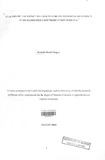Resource information
Agriculture is the backbone of the Kenyan economy contributing 26% to GDP and 70% to
employment. Majority of the farmers in Kenya are smallholder farmers possessing less than 3
acres of land. The agricultural sector in Kenya has been facing several challenges among them
declining yields. While the decline in yields could be associated with several other factors, it
could also be as a result of the effect of insecure land tenure systems which are little understood.
This study examines the technical efficiency of alternative land tenure systems among
smallholder farmers and identifying the determinants of inefficiency with the objective of
exploring land tenure policies that would enhance efficiency in production. The study is based on
the understanding that land tenure alone will not be enough to indicate the levels of efficiency of
individual farms, other socio economic factors such as gender, education and farm size would
also be expected to be important determinants of efficiency. A stochastic frontier was used to
estimate technical efficiency and relate it to land tenure and socio economic factors using data
from 22 districts from the main agro–ecological zones.
The study found that parcels with land titles have a higher efficiency level. Other factors such as
education status of head, access to fertilizers, and group participation were also found to
significantly influence technical efficiency. The study recommends that the process of land
registration should be extended to other regions of the country but at the same time other factors
such as access to inputs and improvement of education status should also be addressed.


